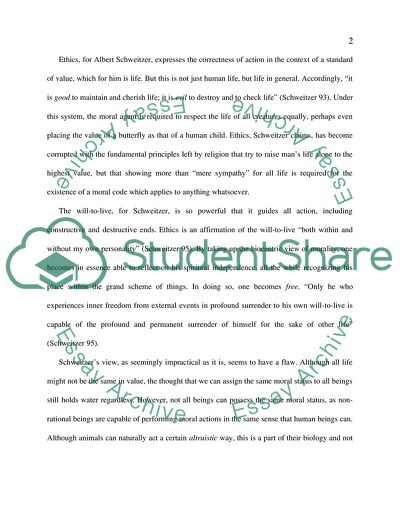
- Home
- Free Samples
- Premium Essays
- Editing Services
- Extra Tools
- Essay Writing Help
- About Us
- Studentshare
- Subjects
- Miscellaneous
- Comparative Anaylsis
Comparative Anaylsis - Essay Example

- Subject: Miscellaneous
- Type: Essay
- Level: Masters
- Pages: 4 (1000 words)
- Downloads: 0
- Author: cooper82
Extract of sample "Comparative Anaylsis"
Two accounts of so-called “biocentric ethics” challenge the notion that the criterion by which we choose particular forms of life to value and others to not. They say, to some degree, that morality between beings within our own species is only possible if we extend that same kind of treatment and moral consideration to beings of all other living species. This, of course, relies on the notion that all life contains some value. For Albert Schweitzer, in his piece “Reverence for Life”, this manifests itself in a kind of what he calls “will-to-life”, which is essential to all living creatures.
For Paul Taylor, in his piece “Biocentric Egalitarianism”, the “will-to-life” is more a matter of teleology: each creature acts toward the end of its own perfection, or natural goodness. Because each creature possesses such inherent value (according to Schweitzer’s arguments), and human beings are no more valuable than any other creature, it follows that human beings should recognize the fact of their egalitarian existence on the same plane as the rest of Earth’s biosphere. These arguments, of course, dispose of conventional wisdom about man’s place in the cosmos—that he has no special place or that he is by natural equality, and by moral requirement, compelled to respect the plethora of life which surrounds him.
Ethics, for Albert Schweitzer, expresses the correctness of action in the context of a standard of value, which for him is life. But this is not just human life, but life in general. Accordingly, “it is good to maintain and cherish life; it is evil to destroy and to check life” (Schweitzer 93). Under this system, the moral agent is required to respect the life of all creatures equally, perhaps even placing the value of a butterfly as that of a human child. Ethics, Schweitzer claims, has become corrupted with the fundamental principles left by religion that try to raise
...Download file to see next pages Read MoreCHECK THESE SAMPLES OF Comparative Anaylsis
Comparative Analysis
Comparative Analysis of Impeachment of American Presidents
Comparative Analysis
Agency Theory and Rise of Corporate Governance Globally
Comparative Analysis
The Pixar Marketing Comparative Analysis
Comparative Analysis of Behavior Therapy
Comparative Anaylsis: Leopolds Land Ethic and Callicott's In Defense of the Land Ethic

- TERMS & CONDITIONS
- PRIVACY POLICY
- COOKIES POLICY